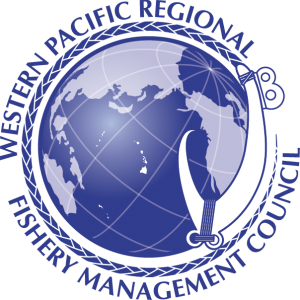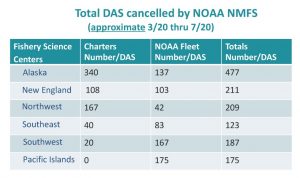News and Announcements
Press Release – COVID-19 Impacts on Fisheries and NOAA Surveys among the Concerns Addressed by the Nation’s Fishery Management Councils (29 May 2020)


 HONOLULU (29 May 2020) Leaders of the nation’s eight Regional Fishery Management Councils concluded the first of their biannual meetings in 2020 today by videoconference. The Council Coordination Committee (CCC) meeting provides the Councils and heads of the National Marine Fisheries Service (NMFS, also known as NOAA Fisheries) an opportunity to discuss issues relevant to all of the Councils. The meeting is open to the public. Nearly 200 persons attended the two-day meeting. Among the top concerns of the CCC were impacts of COVID-19 on the nation’s fisheries.
HONOLULU (29 May 2020) Leaders of the nation’s eight Regional Fishery Management Councils concluded the first of their biannual meetings in 2020 today by videoconference. The Council Coordination Committee (CCC) meeting provides the Councils and heads of the National Marine Fisheries Service (NMFS, also known as NOAA Fisheries) an opportunity to discuss issues relevant to all of the Councils. The meeting is open to the public. Nearly 200 persons attended the two-day meeting. Among the top concerns of the CCC were impacts of COVID-19 on the nation’s fisheries.The CCC expressed its appreciation to Chris Oliver, NOAA Assistant Administrator for Fisheries, for his unwavering support of fishing-related industries and his efforts to work with the President and his administration on the Executive Order (EO) Promoting American Seafood Competitiveness and Economic Growth. The EO asked the Councils to identify and make recommendations regarding regulatory burdens on domestic fisheries. In advance of individual Council recommendations regarding the EO, the CCC will send a letter to Secretary of Commerce Wilbur L. Ross Jr. collectively reiterating their recommendation to remove existing monument fishing prohibitions and to restore authority over fisheries throughout the U.S. exclusive economic zone (EEZ), including marine national monument waters, to the Councils and the Department of Commerce under the Magnuson-Stevens Fishery Conservation and Management Act (MSA).
The CCC noted that the CARES Act included $300 million to address impacts of COVID-19 on the nation’s fisheries. It recommended, if additional funds are provided to mitigate the impacts on the industry, that distribution of those funds should take into account the use of other relief programs, such as those offered through the Small Business Administration, US Department of Agriculture and Paycheck Protection Program. The CCC said, as a general principle, entities that receive support from other programs should be given a lower priority than those that do not. It also said funding allocations should consider loss directly related to COVID-19.
“The biggest impact to US commercial fisheries in the Western Pacific Region and our ability to provide food to the nation is our inability to fish in 83 percent of the US EEZ waters around Hawaii and 52 percent of the US EEZ in our region due principally to marine national monument fishing restrictions,” noted Taotasi Archie Soliai, chair of the Western Pacific Council, which hosted the meeting.
Francisco (Cisco) Werner, PhD, NOAA Fisheries chief science advisor and director of its Scientific Programs, reported that NOAA has cancelled approximately 55 surveys (includes multiple legs of individual surveys), involving NOAA vessels, partner vessels (e.g., academia, states, etc.) and commercial charters. To date, these surveys account for approximately 1,380 lost planned days-at-sea (DAS) between March 20 and July 20, 2020, due to COVID-19.
The CCC requested that NMFS provide more information on its plans and strategies to deal with the delays in the NOAA ship and chartered surveys and on any alternative use of the unused portion of NMFS funds allocated for surveys and mission DAS for FY2020.
Offshore wind energy projects concerned several Councils. The CCC discussed the need for a process for Councils to weigh-in on and verify impacts of wind energy projects to fisheries in their region. It was noted that, although NMFS efforts are largely focused on assessing impacts, the New England and Mid-Atlantic Councils have not had much response to their recommendations to minimize those impacts through their proposals on where and how the turbines should be placed in the ocean. The Western Pacific Council expressed concern that offshore wind areas would take away fishing grounds and act as fish aggregating devices and could affect seasonal migrations of fish and attract juvenile fish and protected species. It was also concerned about the impacts from undersea cables on benthic habitats and bottom substrate. The Pacific Council had concerns about the use of short data sets not reflecting the expected effort patterns in fisheries that are being rebuilt and will be reopened soon.
The CCC made several additional recommendations to better coordinate Council and NMFS actions, including the following among others:
- Continue the development of an approach and implementation plan to openly track the status of all Policy Directives, Procedural Directives, and associated Supplements (such as regional implementation plans).
- Provide sufficient time for Councils to review and comment on the draft Procedural Guidance for Changing Assessed Stock Status from Known to Unknown.
- Provide statutory assistance for clarifying aquaculture authorities.
The CCC approved a habitat partner engagement letter and sending it. The CCC further approved conducting a Fisheries Science Center Engagement Webinar.
The CCC expressed concern that NMFS guidance on data poor stocks and alternative management approaches may not provide adequate guidance on MSA National Standard 1 to resolve conflicts that arise between scientific advice and the constraints imposed by current laws and policies. It was also concerned that the guidance may not adequately address the need for status determination criteria for model-resistant stocks.
The CCC supported the recognition of functional equivalency in the proposed National Environmental Policy Act (NEPA) procedure revision. It believed that MSA actions fulfill NEPA requirements because the development of fishery actions is inherently an environmental review process and provide ample opportunities for public review. The CCC said it looked forward to working with NMFS and the White House Council on Environmental Quality to develop agency guidance for determining functional equivalence and implementing the functional equivalency provision. It encouraged NMFS to initiate the process for applying the provision to MSA actions as soon as possible, in coordination with the Councils.
For more information on the CCC meeting, go to http://www.fisherycouncils.org/ccc-meetings/may-2020.
FISHERY MANAGEMENT COUNCILS: CARIBBEAN: Carlos Farchette, Chair; Miguel Rolon, Executive Director; GULF OF MEXICO: Dr. Thomas Frazer, Chair; Dr. Carrie Simmons, Executive Director; MID-ATLANTIC: Mike Luisi, Chair; Dr. Christopher Moore, Executive Director; NEW ENGLAND: Dr. John Quinn, Chair; Thomas Nies, Executive Director; NORTH PACIFIC: Simon Kinneen, Chair; David Witherell, Executive Director; PACIFIC: Phil Anderson, Chair; Chuck Tracy, Executive Director; SOUTH ATLANTIC: Jessica McCawley, Chair; John Carmichael, Executive Director; WESTERN PACIFIC: Taotasi Archie Soliai, Chair; Kitty M. Simonds, Executive Director.

